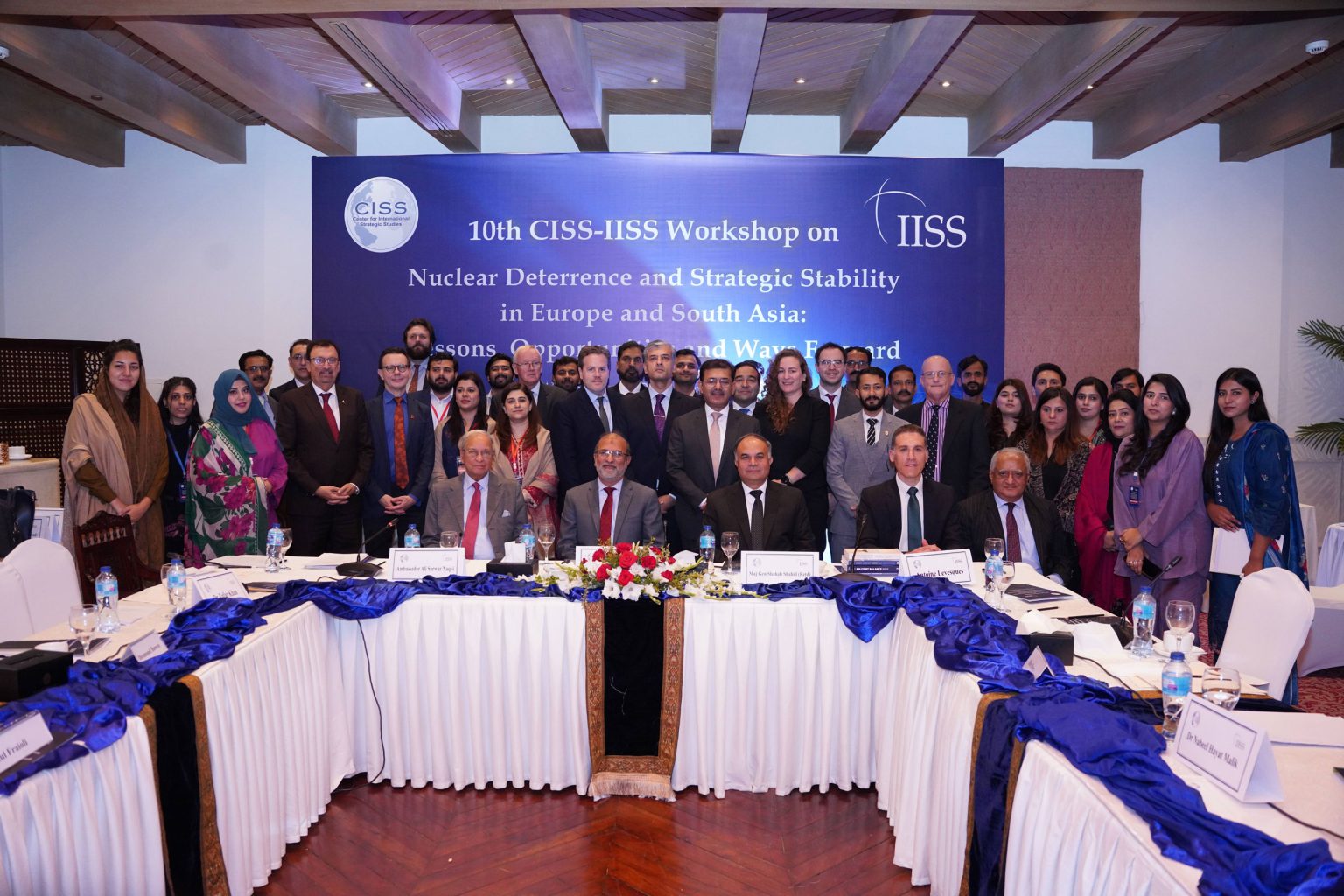Press Release
The Center for International Strategic Studies (CISS) in Islamabad, in partnership with the International Institute for Strategic Studies (IISS) in London, hosted the 10th edition of their joint workshop titled “Nuclear Deterrence and Strategic Stability in Europe and South Asia: Lessons, Opportunities, and Ways Forward.” The event, held in Islamabad, gathered senior policymakers, former diplomats, retired military officials, scholars, and practitioners.
The workshop focused on the changing landscape of global strategic stability amid major geopolitical shifts. Speakers discussed the resurgence of great power rivalry, the erosion of international arms control agreements, and the revival of nuclear competition as international norms decline. The discussions identified emerging trends from ongoing Russia-Ukraine conflict and the May 2025 conflict between India and Pakistan.
The discussions highlighted that the decline of arms control regimes, especially the uncertainty about the future of the New START Treaty and the weakening of the Comprehensive Test Ban Treaty (CTBT), has increased global insecurities. Speakers mentioned that record global defense spending, combined with rapid advances in emerging technologies like artificial intelligence, hypersonic systems, and autonomous platforms, is shortening decision-making timelines, which raises the risk of miscalculation and accidental escalation.
Speakers noted that nuclear weapons have once again become a central focus in the national strategies of nuclear-armed states. The modernization of nuclear arsenals by major powers and the permissive flexibility in doctrinal limits on nuclear use were viewed as concerning developments, risking a reversal of decades of progress toward restraint. It was also observed that recent rhetoric about the potential resumption of nuclear testing could further damage long-standing non-proliferation norms and destabilize the international security framework.
The workshop also explored how these global shifts resonate in South Asia, where strategic stability remains greatly influenced by India’s military modernization, doctrinal ambiguity, and expanding strategic partnerships with Western countries. Pakistani speakers highlighted that Pakistan’s policy of Full Spectrum Deterrence remained robust in maintaining regional stability by deterring Indian aggression and preventing India from pursuing limited war under the nuclear threat.
The event ended with a shared understanding that, in an era characterized by renewed great power competition, technological disruptions, and strategic uncertainty, there is an urgent need for holding dialogue, strengthening arms control frameworks, and establishing crisis management mechanisms. Participants agreed that credible deterrence, along with responsible conduct and diplomatic engagement, remains vital to maintaining both regional and global stability. Speakers from the IISS included Antoine Levesques, Nigel Gould-Davies, Paul Fraioli, Meia Nouwens, Daniel Salisbury, Ben Berry, Desmond Bowen, and Karl Dewey. Pakistani speakers included Ambassador Ali Sarwar Naqvi (Retd) Ambassador Zamir Akram (Retd), Ambassador Qazi Khalilullah (Retd), Lt Gen Amer Riaz (Retd), Dr. Zafar Nawaz Jaspal, Dr. Zafar Khan, Brig Dr. Naeem Salik (Retd), Air Cdre Khalid Banuri (Retd), Air Cdre Dr. Adil Sultan (Retd), and Brig Dr. Zahir Kazmi (Retd). The keynote address was delivered by Lt Gen Nadeem Zaki Manj (Retd), Advisor to the National Command Authority and former Director General of the Strategic Plans Division (SPD), where he emphasized that “Pakistan’s Full Spectrum Deterrence and disciplined approach underscore a commitment to stability, demonstrating that responsible strategic conduct, rather than unilateral aggression, defines sustainable security in the region.”

